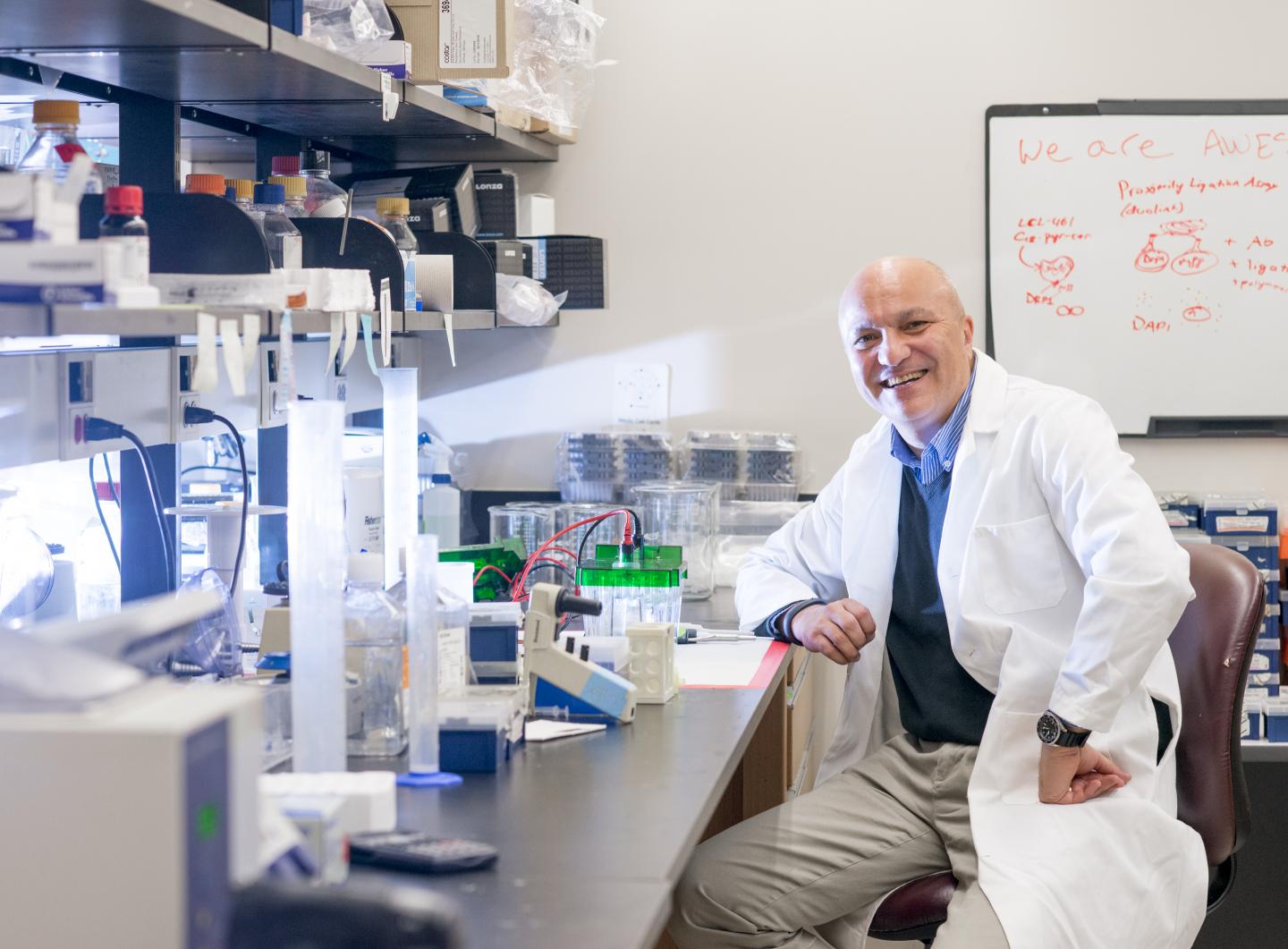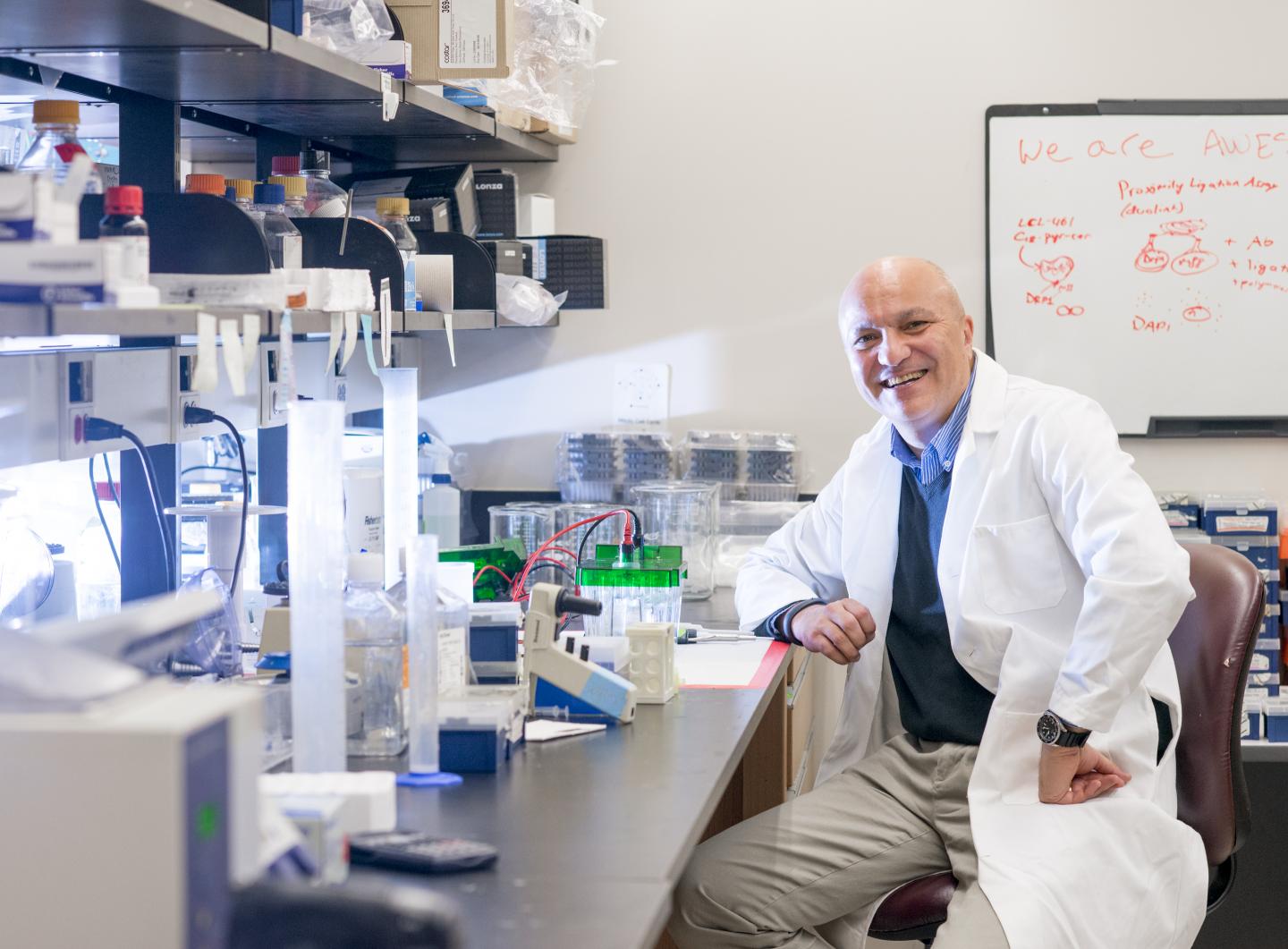
Credit: Brennan Wesley
Scientists at Hollings Cancer Center at the Medical University of South Carolina have found that human lung cancer cells resist dying by controlling parts of the aging process, in results published online May 10th in the Journal of Biological Chemistry. The discovery could help us better understand aging and eventually could lead to new treatments for cancer.
Cancer becomes more common as people get older, but scientists are still searching for answers about why this happens. At Hollings Cancer Center, research into the connections between aging and cancer is led by Besim Ogretmen, Ph.D., SmartState Endowed Chair in Lipidomics and Drug Discovery. Ogretmen's team found that cancer cells have specific ways to resist dying the way normal cells do. They do so by protecting the tips of their chromosomes, which hold our DNA, from age-related damage.
Ogretmen studies how cancer cells are different than normal cells to understand how cancer grows and spreads in the body. His work is part of an $8.9 million program project grant to research how alterations of lipid metabolism affect cancer therapy. The grant is helping fund a clinical trial of an anticancer medicine to inhibit cellular signaling that helps cancer survive. The drug was found to be useful against cancer in the research reported in the group's new paper.
As normal cells get older, the tips of their chromosomes, called telomeres, can start to break down, which is a signal for the cell to die. This seems to be part of the aging process in normal cells. However, cancer cells have developed a way to prevent their telomeres from falling apart, which helps them to live much longer than normal cells. The long life of cancer cells is part of what allows them to grow and spread throughout the body.
In their new paper, Ogretmen's research group discovered a specific way that cancer cells escape death in response to telomere damage. Scientists have known that various types of cancer cells have low levels of a protein called p16. Ogretmen's group found that, when telomeres become damaged by age or in response to chemotherapy, p16 is a type of cellular decision-maker, where it helps cells decide to grow older or to simply die.
"Telomeres are like a biological clock for our cells," said Ogretmen. "In cancer, this biological clock is broken."
The researchers found that p16 became most important to cells when their telomeres began to break down. When that happened, p16 rushed into action and pushed cells toward further aging by inhibiting cell death.
To determine the clinical impact of these data, the researchers used a chemical enzyme inhibitor to cause telomere damage in several types of cancer cells, including lung cancer cells. The inhibitor, ABC294640, acts in a way that prevents cancer cells from protecting their telomeres, by inhibiting an enzyme called sphingosine kinase 2. This inhibition was shown to force telomeres to break down.
As a result of this enzyme inhibition, telomeres were damaged, resulting in cancer cell death when p16 levels were low or absent. However, cancer cells with high levels of p16 were able to escape death, and stayed biologically inactive, which was a sign of aging.
"We're excited that there is at least one mechanism that can help us understand how aging is associated with a higher risk of cancer," said Ogretmen. "And then, can we prevent or better treat the aging-related cancers by controlling protective effects of p16 for cancer cell death?"
Ogretmen's group is enthusiastic that the inhibitor in their study might help combat cancer at many levels. The team has already identified the safest dose for use in patients and is planning a phase 2 clinical trial using their inhibitor in patients with a type of liver cancer called hepatocellular carcinoma. The multisite trial will include Hollings Cancer Center, Penn State, the University of Maryland, Mayo Clinic and others.
It is especially important to do this work now, given the predicted forecast by researchers at the National Cancer Institute (NCI) who foresee a 'silver tsunami' of cancer survivors. NCI studies show that by 2040 the number of cancer survivors in the United States will increase by nearly 11 million: from 15.5 million in 2016 to 26.1 million in 2040. A large part of the makeup of the cancer survivor population will shift to older populations. It's estimated that by 2040 only 18 per-cent of cancer survivors will be between ages 50 and 64, and only 8 percent will be younger than 50.
"We hope that maybe we can do both: delay aging and prevent the growth of cancer," said Ogretmen. "That's the ultimate outcome of this."
###
About Hollings Cancer Center
The Hollings Cancer Center at the Medical University of South Carolina is a National Cancer Institute-designated cancer center and the largest academic-based cancer research program in South Carolina. The cancer center comprises more than 100 faculty cancer scientists and 20 academic departments. It has an annual research funding portfolio of more than $40 million and a dedication to reducing the cancer burden in South Carolina. Hollings offers state-of-the-art diagnostic capabilities, therapies and surgical techniques within multidisciplinary clinics that include surgeons, medical oncologists, radiation therapists, radiologists, pathologists, psychologists and other specialists equipped for the full range of cancer care, including more than 200 clinical trials. For more information, visit http://www.hollingscancercenter.org
Media Contact
Dawn Brazell
[email protected]
843-792-3622
@muschealthpn
http://www.musc.edu
Original Source
http://academicdepartments.musc.edu/newscenter/2018/hcc-cancer-and-aging/index.html http://dx.doi.org/10.1074/jbc.RA118.003506





